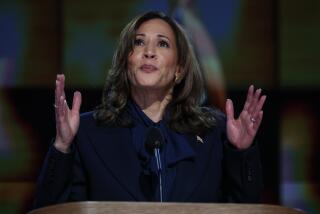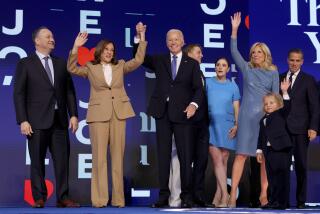We were warned
At a briefing for conservative journalists before the State of the Union address, White House Chief of Staff Josh Bolten said President Bush isn’t wistful about the close of his presidency and doesn’t foresee a day when he will pine to be back in the Oval Office. Chuckles broke out in the room at the perhaps unintentional comparison to Hillary Clinton’s surrogate in chief, who -- as with everything else in his life -- has decided to make the ’08 election all about him.
This got me thinking. Bush came into office promising to be the un-Clinton. And in many ways -- good and bad -- he stayed true to that promise. But as he opened the final chapter of his presidency Monday night, the similarities between his tenure and his predecessor’s seem to have finally eclipsed the differences.
Despite his relative popularity, President Clinton was largely a disaster for his party. He campaigned as a “different kind of Democrat” and helped to marginalize the “progressive” wing of his party. During his term, Democrats lost control of both houses of Congress. Clinton’s triangulating tactics kept his approval ratings high but came at the expense of moving the country to the right on various social and economic issues. President Reagan would have proudly notched Clinton’s signature accomplishments -- welfare reform and passage of the North American Free Trade Agreement -- on his six-guns. And he would have been giddy to proclaim, “The era of big government is over,” as Clinton did in his 1996 State of the Union address.
Now look at Bush’s tenure. He ran in 2000 as a “different kind of Republican.” And just as Clinton moved rightward on race and big government liberalism, Bush tacked leftward toward the center on race and small-government conservatism. In a bipartisan deal with Ted Kennedy, he federalized education policy -- something even Richard Nixon opposed. (And Nixon loved big government, for the record.)
Substantively, Bush has some abiding conservative accomplishments on judicial appointments and tax cuts. But rhetorically, his compassionate conservatism reversed a generation-long stance about the need to curtail the ambitions of government. For Bush, the true measure of good governance wasn’t liberating the American people from an over- weaning welfare state. Rather, activist government became the very definition of good government. And with such ideological markers in place, it was inevitable that government would expand.
Indeed, since 1999, the federal budget has expanded by more than $1 trillion. And while congressional Republicans, now in the minority, claim a newfound hatred for pork-barrel spending, nobody thinks twice about the fact that the GOP oversaw the largest expansion of the government since the Great Society. Monday night, Bush talked a big game about “empowering” and “liberating” the American people. But the most appropriate response to such assurances is: “Now you say that?”
Bush’s speech marked the beginning of the home stretch of the first back-to-back eight-year presidencies since 1824. So the hunger for “change” on both sides of the ideological aisle shouldn’t be much of a surprise.
But that desire for change is also a product of ideological confusion on the left and the right. Clinton left office insisting that he’d restored liberalism in America, but in reality he bequeathed a confused mish-mash of ill-formed ideas, slogans and hatreds. Bush is winding down his presidency much the same way, talking about limited government, personal liberty and spending restraint, but he’s left his party’s troops scattered across the battlefield, with no overarching strategy and an awful lot of friendly fire.
Rush Limbaugh, for example, promises that if either John McCain or Mike Huckabee gets the GOP nomination, it will “destroy the Republican Party. It’s going to change it forever, be the end of it!”
Peggy Noonan replies that “this is absurd. George W. Bush destroyed the Republican Party, by which I mean he sundered it, broke its constituent pieces apart and set them against each other. He did this on spending, the size of government, war, the ability to prosecute war, immigration and other issues.”
I’m sympathetic to both positions. Limbaugh is right that Huckabee and McCain might lead the party further from its limited-government roots. And Noonan is right that Bush let that horse out of the barn long ago. But both complaints overlook a simple fact: We were warned. Bush, like Clinton, promised to be a different kind of leader. And he delivered.
jgoldberg@latimescolumnists.com
More to Read
Sign up for Essential California
The most important California stories and recommendations in your inbox every morning.
You may occasionally receive promotional content from the Los Angeles Times.











